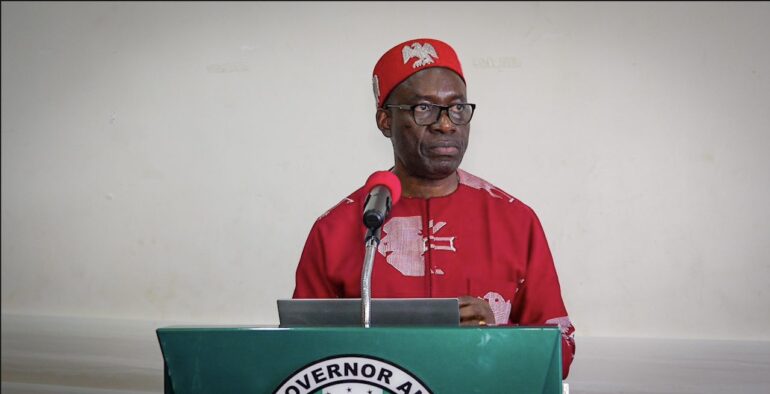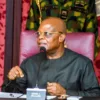On Tuesday, Anambra State Governor, Prof. Chukwuma Soludo, presented the 2025 draft budget proposal of N607 billion to the state House of Assembly, marking a 48% increase from the 2024 budget of N410 billion.
Dubbed “Changing Gears 2.0,” the budget focuses on accelerating development and executing key projects. Governor Soludo described it as a forward-looking plan for continued progress, emphasizing that despite the political activity surrounding the 2025 governorship elections, his administration remains committed to its transformative agenda.
Budget breakdown and priorities
Soludo outlined that of the N607 billion proposed, N139.5 billion (45%) is allocated for recurrent expenditure, while N467.5 billion (48.9%) is earmarked for capital projects. The capital expenditure share is set to remain high, representing 77% of the total budget, while recurrent costs account for 23%, consistent with the 2024 budget’s allocation.
The governor also noted that the budget includes a projected deficit of N148.3 billion, or 24% of the total budget. However, he reassured the Assembly that the state did not borrow to finance the 2023 or 2024 deficits and will seek to avoid borrowing again by focusing on revenue growth and efficient execution.
Key sector investments
Soludo highlighted significant budget increases for key sectors, with education seeing a 101.4% rise, health increasing by 57.1%, and infrastructure investment growing by 38.9%. The social sector, including education and healthcare, will continue to receive substantial attention, comprising over 70% of the budget.
He outlined plans to continue major infrastructure projects, such as the development of three new cities—Awka 2.0, Onitsha 2.0, and a new industrial city—as part of the state’s broader economic transformation agenda. The Anambra Mixed-Use Industrial City Master Plan and railway feasibility studies have already been completed, with financial backing from Afreximbank and the African Development Bank (AFDB).
Promoting investment and economic growth
Governor Soludo emphasized the state’s ongoing efforts to enhance the ease of doing business and make Anambra a preferred destination for investors. He pointed to the success of the recent Anambra Investment Summit, where 10 leading companies signed Memoranda of Understanding. The governor also shared plans to build the largest shopping mall in Africa and develop leisure centers across the state.
In a bid to boost aviation infrastructure, Soludo highlighted recent investments to enhance night landing capabilities at the Chinua Achebe International Airport.
Focus on education and human capital development
Soludo reiterated his administration’s commitment to human capital development, especially in education and healthcare. He reaffirmed the state’s free and qualitative education policy, promising continued investments in both primary and secondary education. He also revealed plans to transform 22 secondary schools into smart schools by 2025, as part of efforts to modernize the education system.
The governor also shared plans to invest N1.2 billion monthly in salaries for teachers in the state’s public schools, excluding pensions. In addition, over 100,000 households will receive agricultural grants to support local farming, continuing the 2024 initiative that provided seedlings to thousands of farmers.
Youth empowerment and social welfare
The governor committed to expanding the state’s One-Youth, Two-Skills programme and launching a One Million Digital Tribe initiative to provide digital skill training to youth. He also pledged continued support for vulnerable groups through grants to micro-businesses in each of Anambra’s 326 wards, in line with the state’s commitment to uplifting citizens under the motto “Onye Aghana Nwanneya” (“Everyone is a brother’s keeper”).
Soludo concluded by emphasizing that the 2025 budget reflects his administration’s determination to build on the momentum of 2024, with a clear focus on infrastructure, economic growth, and human capital development.


